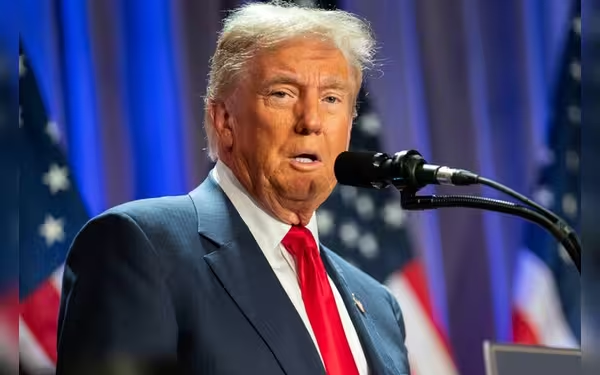Saturday, November 16, 2024 07:57 PM
Gulf Cooperation Council's Expectations from Trump Administration
- GCC seeks political, economic, and cultural collaboration with Trump.
- Focus on resolving Israel-Palestine conflict and trade practices.
- Strengthening ties through GCC-US Strategic Partnership is essential.
 Image Credits: thefrontierpost
Image Credits: thefrontierpostThe Gulf Cooperation Council outlines its expectations from the incoming Trump administration, focusing on political, economic, and cultural collaboration.
The incoming Trump administration is poised to reshape its relationship with the Gulf Cooperation Council (GCC) as it prepares for a new term starting January 20. The swift formation of Trump's team, particularly the appointment of Steve Witkoff as special envoy to the Middle East, signals a hands-on approach to this vital region. During Trump's first term from 2017 to 2021, the GCC experienced a close partnership with the United States, marked by Trump's unprecedented choice of Saudi Arabia for his inaugural foreign trip. This relationship, while not without its disagreements—especially regarding the Israel-Palestine conflict—remained strong throughout his presidency.
As Trump embarks on his second term, the GCC's expectations can be categorized into three main areas: political, economic, and cultural. The Gulf states are particularly interested in Trump's commitment to "ending all wars" and his focus on economic growth. They share a common goal of combating illegal migration and unfair trading practices, although their methods may differ. Additionally, there is a mutual desire to work together against hate and intolerance.
Politically, the GCC seeks to reduce ongoing conflicts and promote diplomacy, aligning with the principles outlined in the UN Charter. The current international landscape is fraught with challenges, particularly due to the discord among the permanent members of the UN Security Council. This dysfunction has hindered the UN's ability to maintain global peace, as evidenced by its failure to intervene in Israel's actions in Gaza and Lebanon.
On the issue of Gaza and the broader Israel-Palestine conflict, the GCC is eager to collaborate with the US to find a resolution. The international community has established clear parameters for peace, advocating for a ceasefire in Gaza and the reunification of the territory with the West Bank under the Palestinian Authority. The recent summit in Riyadh underscored the unified stance of the Arab and Islamic nations, calling for accountability for the atrocities committed in these regions.
Economically, the GCC aligns with Trump's interest in addressing predatory trade practices. However, they believe that the solution lies in reforming the global trading system, which has often pitted developed nations against developing ones. The previous administration's protectionist tariffs, particularly those affecting GCC exports, have created a cycle of retaliation that could escalate further if new tariffs are introduced. The GCC advocates for resolving trade disputes through the World Trade Organization, emphasizing the need to revitalize its dispute resolution mechanisms.
Finally, cultural reconciliation is a priority for the GCC, which seeks to foster mutual understanding and combat the rise of hate speech and crimes globally. The Trump administration has the opportunity to partner with the GCC and the broader Arab and Islamic communities to promote tolerance and reduce cultural tensions.
Fortunately, a robust framework for cooperation exists under the GCC-US Strategic Partnership, encompassing various levels of engagement, from heads of state to technical discussions. This partnership includes over ten working groups addressing critical issues such as political and defense matters, cyber threats, and counterterrorism. The GCC and the US are also active participants in the Combined Maritime Forces, a coalition of nations focused on maritime security.
As the US and GCC countries are significant energy producers, they share overlapping interests in both conventional and renewable energy sectors. Coordinating on monetary policy is also crucial, given that many GCC currencies are pegged to the dollar. Decisions made by the Federal Reserve can directly impact GCC economies, making close collaboration essential.
The incoming Trump administration has a unique opportunity to strengthen its ties with the Gulf states by addressing their political, economic, and cultural aspirations. By fostering cooperation and understanding, both parties can work towards a more stable and prosperous future in the region. The path ahead may be challenging, but with mutual respect and collaboration, the potential for positive change is significant.













